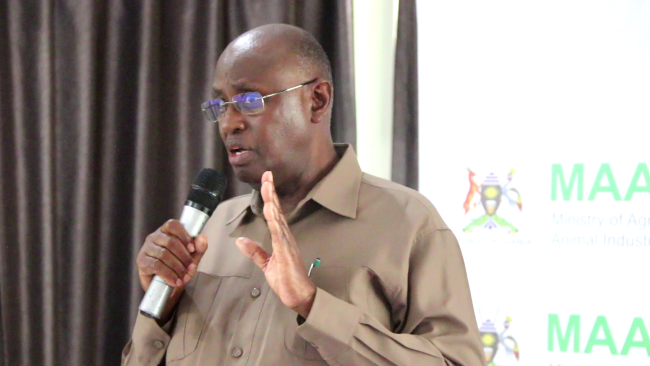MBARARA CITY, November 18, 2024 – The government is set to introduce a new policy for controlling Foot and Mouth Disease [ FMD ] that will involve cost-sharing between the government and farmers in the procurement of vaccines for livestock.
Currently, the government purchases FMD vaccines using taxpayers’ money and farmers get the vaccines at no cost. However, under the new policy, farmers will be required to pay Shs 7,700 per dose of vaccine administered to each animal.
During a stakeholders’ meeting on Friday, attended by district chairpersons, veterinary officers, commercial and production officers, security personnel from the Ankole region, Bright Rwamirama, the State Minister for Animal Industry, explained that the new policy if passed, aims to address the shortage of FMD vaccines in the country.
He noted that government-funded vaccines currently cover only about 10 percent of the country’s livestock, as the available supply is insufficient.
“This policy is designed to help bridge the gap in the procurement of FMD vaccines by the Ministry of Agriculture, Animal Industry and Fisheries,” said Rwamirama. “With the increased participation of farmers, we hope to cover a larger portion of the livestock population.”
Under the new arrangement, farmers will bear the cost of the vaccines, while the government will continue to fund the services of veterinary officers administering the vaccines, as well as the transportation and cold chain costs involved in the vaccine distribution process.
“The government will handle the payment for veterinary officers, transportation of the vaccines, and the cold chain logistics, while farmers will only pay for the vaccines themselves, with a fee that will not exceed two US dollars per dose,” Rwamirama clarified.
The Minister also emphasized that the cost of the vaccines would decrease once Uganda begins local production. “We are planning to start manufacturing our own vaccines, which will help reduce the price,” he said. The money collected from farmers will be held in a revolving fund at the Bank of Uganda, to be used for future vaccine purchases.
The new policy will also introduce a streamlined payment system, enabling farmers to pay easily and access quick veterinary interventions for their livestock from district veterinary officers (DVOs).
Concerns over vaccine costs
Ronald Bameka, the DVO for Lyantonde District, expressed concern over the set fee for the vaccines, suggesting that the cost might be unaffordable for many farmers. “Shs 7,700 per dose is too high for most livestock farmers. I propose that the government start with a fee of Shs 3,000 per dose, and gradually increase it as farmers become more accustomed to the new policy,” Bameka suggested.
Dr. Andrew Akashaba, Principal Veterinary Officer for Mbarara District, also raised concerns about the inadequate supply of vaccines in relation to the district’s livestock population. “Mbarara District has an estimated 150,000 cattle, but we have only been receiving 10,000 doses. Similarly, Kiruhura District, which has about 50,000 cattle, only received 21,000 doses,” Akashaba noted. He expressed hope that the new policy would help address the issue of vaccine shortages.
Support for the new policy
Rev. Samuel Mugisha Katugunda, the Chairman of the Kazo District Local Council, praised the Ministry of Agriculture, Animal Industry and Fisheries (MAAIF) for introducing the new policy. “Our markets have been under quarantine for so long due to FMD, and our local economy has suffered. This new policy provides a much-needed, long-term solution for controlling FMD,” Katugunda said.
Dan Mukago Rutetebya, the District Chairperson for Kiruhura, welcomed the shift in vaccine procurement, stating that it was long overdue. “We have been urging the government to allow farmers to procure vaccines on their own, and this new policy will finally give farmers more control over the vaccination process,” he said.
Concerns about charges for veterinary services
Harriet Nakamya, the Resident District Commissioner for Rwampara, raised a concern about veterinary officers charging farmers for vaccinating their animals. She pointed out that the government provides a facilitation of Shs 200 per dose for veterinary officers’ fieldwork, yet some officers have been demanding additional payments from farmers.
“Every time the government sends vaccines, it includes a facilitation of Shs 200 per dose. Yet, some DVOs have been charging farmers for these services,” Nakamya said. “It is our duty as leaders to ensure that this malpractice stops, especially since government salaries for veterinary officers have been increased.”
FMD, a persistent challenge in the country
Uganda has been grappling with recurring outbreaks of Foot and Mouth Disease (FMD) for decades. This highly infectious disease primarily affects cloven-hoofed animals, including cattle, pigs, sheep, and goats, and is particularly prevalent in the cattle corridor. With the new policy, stakeholders hope to address the ongoing challenges of FMD control and improve the livelihoods of livestock farmers across the country.
https://thecooperator.news/alebtong-district-vaccinates-over-30000-cattle-against-fmd/
Buy your copy of thecooperator magazine from one of our country-wide vending points or an e-copy on emag.thecooperator.news
